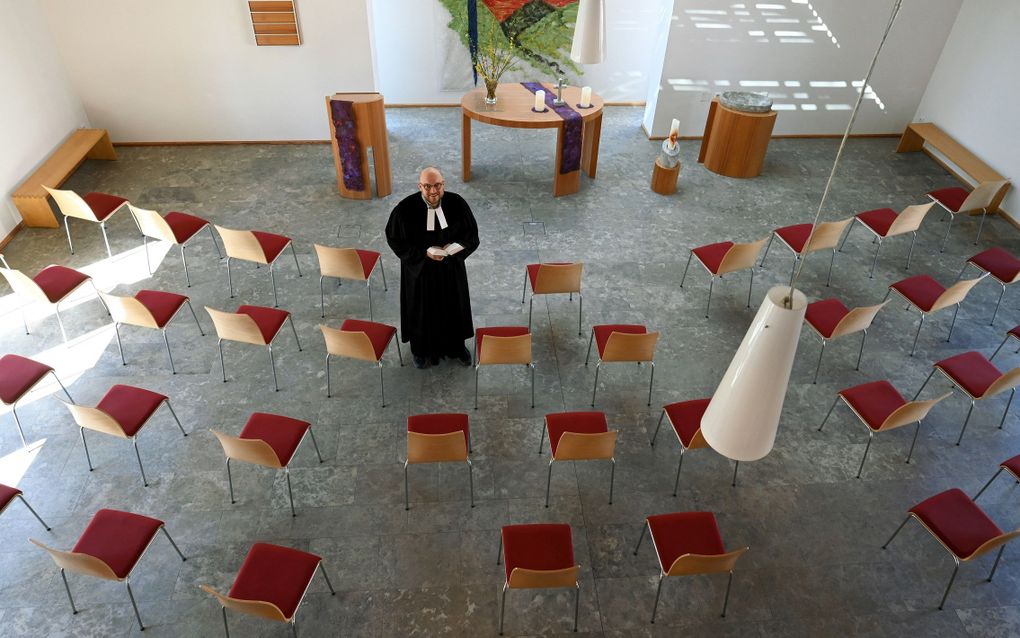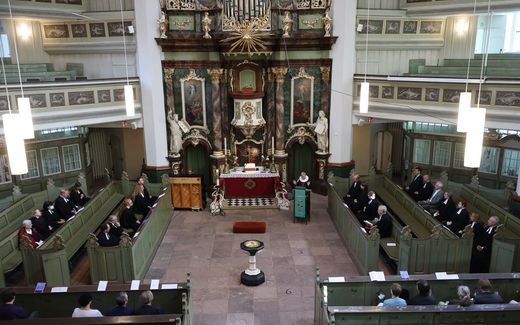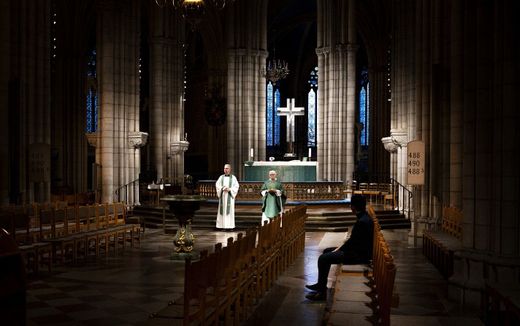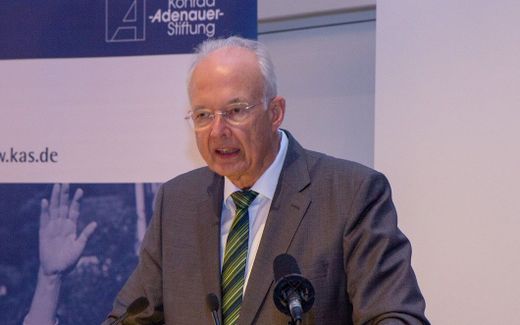Unification Germany contributed to empty church
10-12-2022
Central Europe
René Zeeman, RD

Protestant pastor Hannes Schott poses in the empty hall of the church Katharina-von-Bora in Bayreuth, southern Germany. Photo AFP, Christof Stache
Central Europe
Churches in Germany are losing their members. Together, the believers of the Roman Catholic and Evangelical (Protestant) Churches no longer form a majority of the population. Is Germany experiencing a Zeitenwende, a turning point in history?
As a sociologist of religion, Prof Detlef Pollack has been researching the phenomenon of secularisation for decades. Earlier this year, a completely revised edition of his 600-page standard work "Religion in der Moderne" came out. Since his retirement this year, Pollack has been living in Berlin. For lecturing, he regularly returns to Münster, where he still has his own office overlooking the university church, where, among other things, "wonderful concerts are given".
Pollack calls himself a church Christian. He belongs to a Protestant congregation, which he attends regularly. He grew up in the former GDR (German Democratic Republic, also known as Eastern Germany). There, "the church was one of the institutions that publicly refuted the regime. That was quite an achievement".
The Protestant Church in Germany (EKD) has 19.7 million members. That was revealed this year. That is 23.7 per cent of the German population. The Roman Catholic Church, with 21.6 million members, makes up 26 per cent of the total population. Together, that is 49.7 per cent. That is the first time in centuries that members of the established churches are in the minority. Germany speaks of "a historic caesura".
Do you have an explanation for why churchgoers are a minority in Germany?
"Let's look at the statistics first. Church abandonment has steadily increased over the past decades. That is not the only issue. More importantly, church affiliation is very poorly passed on by parents to their children. Studies show that many children born into Protestant or Roman Catholic families are not baptised, do not take the first communion and do not make confession of faith. Because church affiliation is not passed on from one generation to the next, churches lose 30, 40 per cent of their members."
So church abandonment starts already because parents do not have their children baptised?
"Parents often still attend church but are no longer particularly committed because faith and the church are no longer essential to them. Other things weigh more heavily, such as a successful career, self-realisation, or meeting up with friends at a restaurant. Raising children in the faith is no longer the focus.
And another important point: people want to give children freedom. Their sons and daughters must decide for themselves on their church affiliation. They must make their own decision for or against the church. That basically means a decision against the church because secularisation is strong. Children no longer come into contact with the church if their parents do not take them there. This attitude of self-determination, of respect for the child's autonomy, plays a significant negative role for the church."
Do studies prove so?
"There has been international research on this over the last five or ten years. It turns out that church attendance and passing on the faith to children are of great significance. Church abandonment is not something that happens within one generation. It is an intergenerational change.
We have not known this for a long time. Since then, scholars have been trying to find out what causes parents to stop bringing up their children in a religious way."
What did they discover?
"Mobility and denominational plurality are decisive points. By mobility, I mean parents changing their place of residence. If parents move to another municipality, the church affiliation decreases. Denominational plurality means the father or mother is Protestant, and the partner is Roman Catholic, for example. The likelihood of children being raised religiously decreases if the parents are multi-religious. This plays even more strongly if one of the parents is non-religious."
Does it also play a role that the parents who have to pass on church affiliation to their children hardly attend church themselves?
"The parents were in church. And it is certainly not a given that they leave the church. Yet, they hardly go to church themselves and barely pass on the faith to their children. You see a weakening from generation to generation."
The parents themselves were baptised
"And don't want to leave the church. But for them, faith and the church do not have enough meaning to pass on to the next generation."
People do not see it as their duty to raise their children religiously?
"Exactly, but they often shy away from leaving the church themselves. Then again, that has to do with the family they come from. Sometimes their environment plays a role in their decision. They don't take the step themselves, but they don't invest anything so the children will believe and go to church."
Are there differences between Protestants and Roman Catholics in church abandonment?
"Yes, there are. For example, the church affiliation of Roman Catholics in Germany is clearly stronger than among Protestants."
Surely the abuse scandals must affect members of the Roman Catholic Church?
"The scandals run from 2010 when abuse in the Roman Catholic Church was first reported in Germany. This was followed by an extensive public debate on the scandals.
In the years before, about 0.5 per cent of members left the Roman Catholic Church each year. That was always less than the Evangelical Church, where 0.7 or 0.8 per cent left the church.
Then in 2010, abuse in the archdiocese of Munich and Freising came to light. One would expect Roman Catholics to leave the church en masse. The church-leaving rate went up: from 0.5 to 0.73 per cent. So by half, but no more. It is not that the discussion caused people to leave the church en masse immediately.
Meanwhile, the abuse cases and the church's handling of them have been going on for over a decade now. The church cannot close the discussion and put it behind it. This affects church abandonment. In 2021, more Roman Catholics than Protestants left the church for the second time in history. This is, therefore, due to scandals. Among Protestants, leaving the church is a complex decision."
What do you mean by complex?
"People don't take that step easily. It takes a long time before they say, "I'm putting a period behind it; I'm leaving the church." Ten, twenty or thirty years often precede that step. During that time, people get closer to the church; other times, alienation increases. When Protestants leave the church, several factors often play a role. One of the main ones is: "The church is outdated, it does not fit in our time, it is authoritarian." A second reason: "I can't do anything with the faith. Faith doesn't tell me anything anymore." In other words, religious indifference. Then another reason peeks around the corner: "If I leave the church, I no longer have to pay the church tax." A reason most often mentioned in western Germany reads, "I can be a Christian even without a church."
Can you, therefore, conclude that people remain religious even if they leave the church?
"There are people who say they are also believers outside the church. It turns out that, outside the church, far fewer people believe in God than inside the church. In the church, about 70 or 80 per cent believe in God. Among those without a confession, those outside the church, it is exactly the reverse: only 20 per cent still believe in God."
How should we interpret the fact that 20 per cent of people in the church do not believe in God? What are those people doing in the church?
"The church also lives by its tradition. The church had significance for parents and grandparents. For the grandparents, it is important for the grandchildren to be in the church. The youngsters don't leave the church because they don't want to hurt grandma. But the church itself does not bear any significance for themselves anymore."
Did the German unification play a role in secularisation? In other words, has the secular GDR negatively affected the more Christian citizens of the Federal Republic?
"The churches in the GDR shrank massively. In 1990, just over 20 per cent were members of the Evangelical Church, and 5 per cent were members of the Roman Catholic Church. Say 70 per cent were non-believers. Today, the percentage is almost 80 per cent.
Church abandonment in West Germany began in the second half of the 1960s. We saw a second big increase in the exodus immediately after reunification. My explanation is that with the entry of the East, so many non-believers joined Germany that leaving the church was no longer a taboo. Before that, one had to justify leaving the church. Back then, roughly 80 per cent still went to church. Because the East joined, the overall church level dropped, and people no longer had to provide so many arguments if they left the church."
What measures do churches take to turn the tide?
"The churches are in a constant battle to counter the trend. Since the 1960s, the Protestant Church and, in part, the Roman Catholic Church have been engaged in an ongoing reformation debate. Always the question is: how political should the church be? What is the mission of the church? How can we mobilise church congregations more? In the process, pastors are getting better and better trained. Let me just say the churches are constantly fighting against church decline.
In the 1950s and 1960s, churches trusted that most of the population belonged to them. They were quite self-confident. Ninety per cent of the population were members of a church. The church was a power, also a political power."
A matter of course?
"Yes, the churches performed with an awareness that they had something to say. They had the idea that they were the kit of society. That has completely changed. The change processes of the 1960s made them insecure. They wondered whether they should be more committed to pastoral care or rather be more politically active. They have been having that discussion for decades."
Now churches still receive church tax. Will the church be in trouble if that source of income disappears?
"Five years ago, nobody talked about church tax. In Chancellor Olaf Scholz's new coalition, it is a topic. The coalition agreement states that it should be talked about. The churches have been saying for years that they are willing to talk about it. If the church tax disappears, the church will no longer be able to do a significant part of its work. Think of the diaconate. But many church workers, such as organists, are also paid with church tax money. Church buildings have to be maintained. That costs tons of money."
What does it mean for a country when church attendance declines and the church plays a smaller role in society and politics?
"I believe Christian values that have influenced society will remain. Then I think of values like justice and charity. Those values have been passed on for centuries. Take charity, now people talk about being in solidarity with each other, but that is still vital. So there are more Christian values that I believe will remain, despite the number of Christians declining."
New liberal legislation on abortion, euthanasia and the family have been announced by the current government -a coalition without a Christian party. Is that what awaits a country where Christians are a minority?
"If you look at euthanasia, you have to say that this government does not accept that life is sacred. On the other hand, this government says, "We as human beings do not have the right to dispose of everything. There is a limit." For example, a citizen cannot sell his own organs. Such statements show that there is an awareness that humans cannot freely dispose of themselves. Therefore, despite the number of Christians declining, I cannot say that German society is becoming more secular or amoral."
Do you see that as an influence of Christian ethics in German society?
"The American sociologist Talcott Parsons argues that Christian values in generalised form have entered the modern society of the West. Think of values like charity, solidarity, justice, and sincerity. I gladly subscribe to this thesis. Practised Christian ethics, church care for the sick and weak, preaching and pastoral care have done much to internalise these values."
This article was translated by CNE.news and published by the Dutch daily Reformatorisch Dagblad on December 10, 2022
Related Articles





